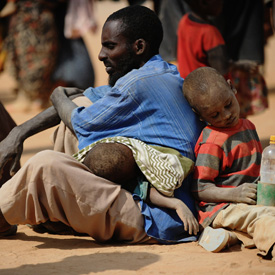Aid agencies broadcast crisis appeal for drought victims
Leading aid agencies launch an appeal to help 10 million people in the grip of Africa’s worst drought in decades, as Oxfam tells Channel 4 News soaring local food prices are compounding the crisis.

The Disasters Emergency Committee (DEC) will broadcast a series of television appeals on Friday as a joint plea for aid is launched to help the hundreds of thousands of people caught up in the crisis.
More than 10 million people across the Horn of Africa are suffering the worst drought in 60 years as crops fail and livestock perishes.
After seasons of failed rains vast swathes of land in countries such as Kenya, Somalia, Ethiopia and Djibouti are suffering from severe drought.
In the worst affected areas thousands have been forced to abandon their homes in search of food, water and refuge. Many families have had to walk with few supplies for days at a time for aid.
According to the DEC, which co-ordinates responses to major disasters overseas, more than 1,300 people – the majority of whom are youngsters – are arriving in the Dadaab refugee camp in eastern Kenya every day.
The camp is already believed to be the largest of its kind in the world with a population of over 380,000. Many seeking refuge come from neighbouring Somalia, fleeing violence compounded by drought and rising food prices.
Food prices
Oxfam – whose aid appeal has already generated £270,000 – told Channel 4 News that high local food prices were exacerbating the problem.
“In some areas the price of maize has increased by 60 per cent in a year as drought pushes prices up,” a spokesman for Oxfam told Channel 4 News.
“The price of cereal has gone up enormously, and yet herds have perished meaning people can’t sell their livestock at markets. The price of their assets has plummeted.”
The increased frequency of drought in the east Africa means many people cannot sufficiently recover before the next dry season hits.
The daily struggle to save starving Somalis
Save the Children blogs for Channel 4 News from Somalia
A story told to me by one of our staff I can't get out of my mind. I was told that a mother came to our office and said, "I've come for help. I've left my children at home because I can't stay there and watch them die."
By the time our staff got to her home two of her children had died. I have been haunted by this ever since I heard it.
Read more from Save the Children here.
DEC chief executive Brendan Gormley stressed the need for a “long-term solution” but said the immediate priority for aid agencies was to prevent a “tragedy”.
“Slowly but surely, these people have seen their lives fall apart – crops, livestock and now their homes have been taken by the drought,” he said.
“They’ve been left with no alternative but to seek shelter and life-saving help elsewhere. We have a duty to help quickly before the situation spirals out of control.
“Many of these are a forgotten people, caught in the midst of conflict in Somalia and an ever-worsening environmental crisis.”
Donate
Earlier this week, the Department for International Development (DfID) pledged £38m to the World Food Programme which will provide the food aid that the DEC will be distributing.
International Development Secretary, Andrew Mitchell, welcomed the DEC appeal to bring in additional support to make sure aid agencies could reach all of those “in desperate need”.
The DEC appeals will be broadcast on ITV/ITN, BBC, Sky, Channel 4 and Channel Five.
To make a donation to the DEC East Africa Crisis Appeal call the 24 hour hotline on 0370 60 60 900, visit www.dec.org.uk or donate over the counter at any post office or high street bank, or send a cheque. You can also donate £5 by texting the word CRISIS to 70000